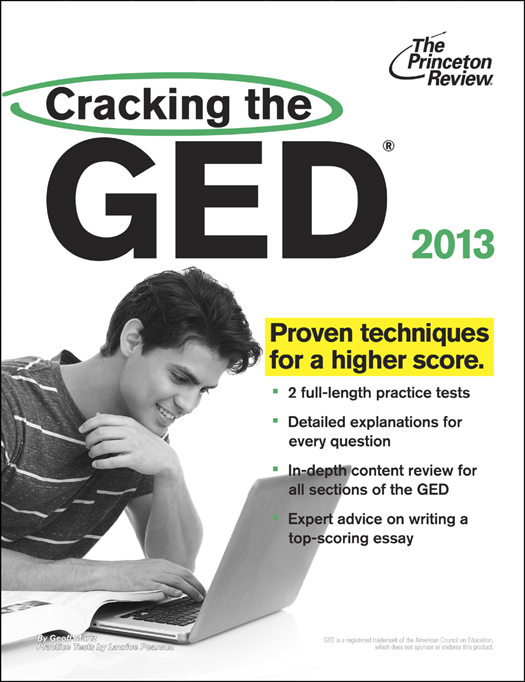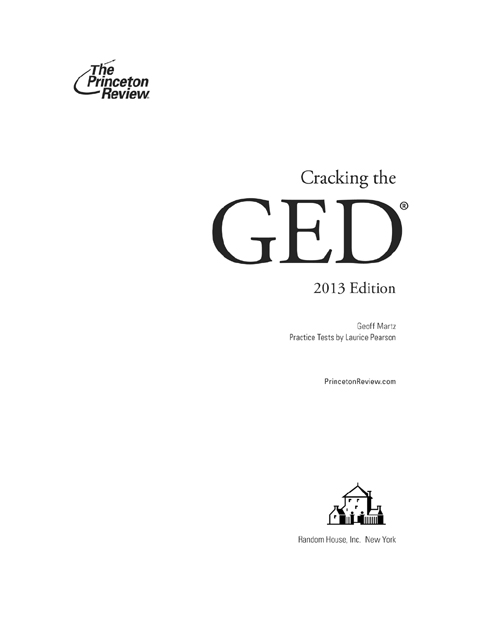
Editorial
Robert Franek, Senior VP, Publisher
Laura Braswell, Senior Editor
Selena Coppock, Senior Editor
Calvin Cato, Editor
Meave Shelton, Editor
Production
Michael Pavese, Publishing Director
Kathy Carter, Project Editor
Michelle Krapf, Editor
Michael Mazzei, Editor
Michael Breslosky, Associate Editor
Stephanie Tantum, Associate Editor
Kristen Harding, Associate Editor
Vince Bonavoglia, Artist
Danielle Joyce, Graphic Designer
Random House Publishing Group
Tom Russell, Publisher
Nicole Benhabib, Publishing Director
Ellen L. Reed, Production Manager
Alison Stoltzfus, Managing Editor
The Princeton Review, Inc.
111 Speen Street, Suite 550
Framingham, MA 01701
E-mail:
Copyright 2012 by The Princeton Review, Inc.
Cover image Jonathan Pozniak
The Princeton Review is not affiliated with Princeton University
All rights reserved. Published in the United States by Random House, Inc., New York, and in Canada by Random House of Canada Limited, Toronto. This is a revised edition of a book first published in 1989.
Permission has been granted to reprint portions of the following:
The GED instructions to the tests
The GED list of frequently misspelled words
The GED essay scoring guide
Dinner at the Homesick Restaurant by Anne Tyler, Alfred A. Knopf, New York, 1982
The Honourable Schoolboy by John le Carr, Alfred A. Knopf, New York, 1977
Six Degrees of Separation by John Guare, Vintage Books, New York, 1990
Cat on a Hot Tin Roof by Tennessee Williams, New Directions, New York, 1955
Scribble, Scribble by Nora Ephron, Alfred A. Knopf, New York, 1975
The American Way of Death by Jessica Mitford, Fawcett Crest Books, New York, 1963
The Palm at the End of the Mind by Wallace Stevens, Vintage Books, New York, 1967
The Poetry of Robert Frost, edited by Edward Connery Lathem; Holt, Rinehart and Winston; 1916
The Ginger Man by J. P. Donleavy, Delacorte Press, 1972
When One Has Lived a Long Time Alone by Galway Kinnell, Random House, New York, 1990
Sula by Toni Morrison, Alfred A. Knopf, New York, 1974
Films in Review, Rain Man by C. M. Fiorillo, March 1989
Six Plays by Lillian Hellman, Vintage Giant, New York, 1979
My ntonia by Willa Cather, Vintage, New York, 1990
Collected Poetry by Dorothy Parker, Modern Library, New York, 1926
eISBN: 978-0-307-94449-8
Editor: Meave Shelton
Production Editor: Michelle Krapf
Production Coordinator: Deborah A. Silvestrini
2013 Edition
v3.1
Acknowledgments
Thanks to Susan Limongelli for her work on this edition, and to the staff and students of The Princeton Review.
Special thanks to Adam Robinson, who conceived of and perfected the Joe Bloggs approach to standardized tests, and many other techniques in this book.
Contents
So Much More Online!
More Information on Careers
- Learn more about career books from The Princeton ReviewGuide to Your Career, 145 Things to be When You Grow Up, 120 Jobs That Wont Chain You to Your Desk, Best Entry Level Jobs
- Career quiz and career search
More Information on College
- Learn about more books on college from The Princeton ReviewThe Complete Book of Colleges, The Best 377 Colleges, The Best 300 Professors, The Best Value Colleges
- Detailed profiles for hundreds of colleges help you find the school that is right for you
- Dozens of Top 20 ranking lists including Quality of Professors, Worst Campus Food, Most Beautiful Campus, Party Schools, Diverse Student Population, and tons more
- Useful information about the admissions process
- Helpful information about financial aid and scholarships
- College Search combines your academic and extracurricular history with your school preferences to find the perfect college for you
Part I
Orientation
Chapter 1
Getting Started
This chapter will provide you with a description of exactly what is tested by the GED. It will also explain how to use this book to maximum effect while preparing for the test.
Listed below in the gray box on this page are just a few of the famous and successful people who took the GED and earned their equivalency certificate.
Perhaps you have something in common with them. People take the GED for many reasons. Some people are home schooled. Some people leave high school before they graduate. Some people have careers that do not enable them to attend a traditional high school.
Thats a Lot of People!
In 2009, more than
780,000 candidates took
some portion of the
GED test battery.
(Source: American Council on
Education [ACE])
Whatever their reasoning, you have something in common with all of the people on the list below. All of them had the desire to succeed.
You have the desire to succeed, too. How do we know? Well, for one thing, you bought this book, which means youve decided to take the GED. And taking the GED is one step toward making your life work the way you want it to.
Passing the GED can be an important step in your life because it shows other people and yourself that you have the follow-through to decide on a course of action and make it happen. It can be the starting place for admission to college, a promotion, or a pay raise. So, congratulations! Youve made an important decision.
Famous People Who Took the GED and Earned their Equivalency Certificate
Wally Amos
Walter Anderson Augusten Burroughs
Senator Ben Nighthorse Campbell
Michael Chang
Bill Cosby Eminem
Governor Jim Florio
Jerry Garcia
Michael J. Fox
Paris Hilton
D. L. Hughley
Bishop J. D. Jakes
Peter Jennings
Avril Lavigne
Fran Lebowitz
Governor Ruth Ann Minner
Danica Patrick
Mary Lou Retton
Chris Rock
Jessica Simpson
Britney Spears
Hilary Swank
Christian Slater
Dave Thomas
Mark Wahlberg
Tammy Wynette
This book is here to help you make it happen.
WHAT IS THE GED?
The General Educational Development test is actually five small tests that you can take in one day or over a series of days. Many people call the GED the high school equivalency test because when you pass the test, you earn a certificate that most colleges and employers recognize as the equivalent of a high school diploma.
The questions on the test are all in multiple-choice format, except for one short essay that is part of your Language Arts, Writing test and a few short-answer problems on the Math test. The questions are supposed to measure your knowledge of some of the subjects taught in high school. However, the GED test writers dont expect you to remember specific details. For example, you will not be asked what year Columbus came to America or which planet is farthest away from the sun. If the GED test writers want to ask about Columbus, they will first provide you with a short reading passage about him, and then they will ask questions based on that passage. If the GED test writers want to ask about the planets, they will first give you a diagram of the solar system and then ask you questions based on that diagram.






